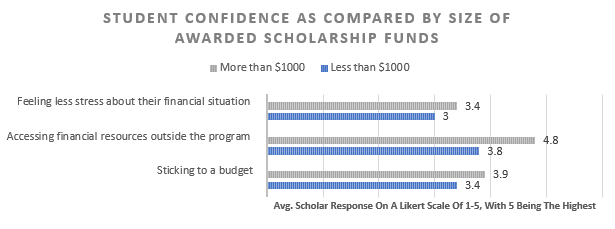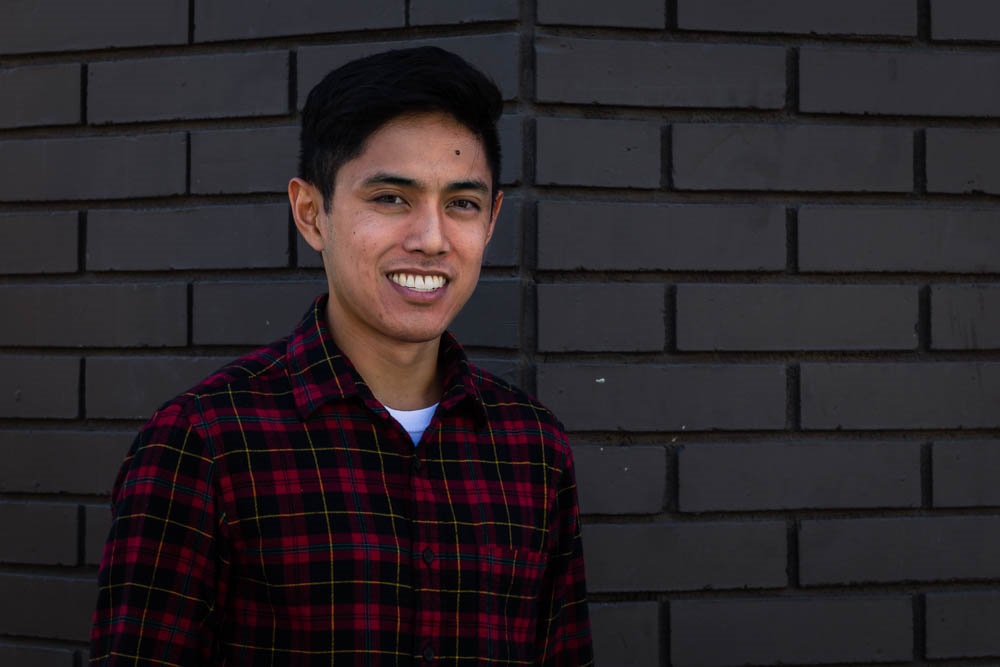To continually provide meaningful and evaluation-driven programming, Words Alive commenced on a seven-month Dialogues in Action (DIA) project to analyze the impact of our Words Alive Westreich Scholarship (WAWS) program using a blended qualitative and quantitative evaluation model. Through this process, we had an opportunity to view our program through the lens of the scholarship recipients, past and present, and their mentors to determine opportunities to enhance our program delivery.
Throughout this process, we identified eight findings and then brainstormed ways we could update and improve the program based on these findings. Here is the third finding!
An image of Jessica Fryman, Teen Services Program Manager, standing with mentor-mentee pair Alison and Paulina at the 2018 Words Alive Westreich Scholarship Award Ceremony.
Consistent Mentoring Inspires Consistent Students
Historically, the first-year scholarship students don’t answer emails, show up late, if at all, miss important deadlines and struggle to follow up when they say they will. Few offer excuses or apologies because before they entered the program, they were not accustomed to being asked for an explanation.
Interviews with scholars, all graduates of alternative high schools, revealed that they were unprepared for what would be expected of them in college and “the real world.” But through the norms and expectations of the WAWS program, scholars start to realize what is expected of them in the program, in school, future jobs and in healthy adult relationships.
About communicating violated expectations, one mentor said:
“I tried to be direct and honest. When my [first-year mentee] stood me up once or twice, I wrote her a letter and sent it to her home, telling her my expectations and how she had let me down. I hope she has a better idea that you have to show up and that commitments mean something.”
Scholars who met with their mentor consistently, on the other hand, demonstrated how that consistency became part of how they operated. This was especially true for scholars who had multi-year experiences in the program.
One such scholar, who now works as a financial advisor and manages a small group of employees, attributed her leadership skills to her mentor’s consistency:
“[My mentor] would visit me at school. We kept in contact and would catch up often, we would go hiking or meet up to eat. She was a really good friend,” the scholar said. “[She] taught me what it meant to be consistent.” – Scholar, age 18
Another scholar went on to say: “[My mentor] keeps me on track and helps me think of how to tackle things – usually along the lines of ‘stay on top of that until it’s done’, listing actions she’s taken as a result: consistently visiting professors during office hours to ask for grade progress or get help and following up by phone if an email goes unanswered. I’m adulting way better because of these skills.” – Scholar, age 26
When consistency in relationships becomes a habit, it bleeds into other aspects of life. Our research shows scholars with consistent mentorship also study regularly, turn in assignments on time and pay their bills when they are due.
One hundred percent of the scholars surveyed said they now take advantage of academic, professional and community resources at their disposal. Again, students who met with their mentor more frequently reported better follow through and higher competencies in several skill sets as demonstrated in the graph below.
A graph titled “Comparison of students’ self-reported growth in competencies based on frequency of mentor meetings”
Significance
The lives of most scholars up to the point of participating in the program have been anything but consistent. Their parents have been in and out of jail, in and out of drug rehab centers – and essentially, in and out of their lives. At times, the scholars have been unsure where they will sleep on any given night or when they will eat their next meal. Surviving one day to the next is all they know.
But when an engaged Words Alive mentor enters the picture, it gives the scholar new context for what it means to be reliable, to be professional, to be a successful adult. Like all skills – consistency is a learned behavior. Mentors who consistently interact with the scholars keep them accountable to the requirements of their schools, the scholarship program and their goals.
Learn more about the Words Alive Westreich Scholarship program here!




















